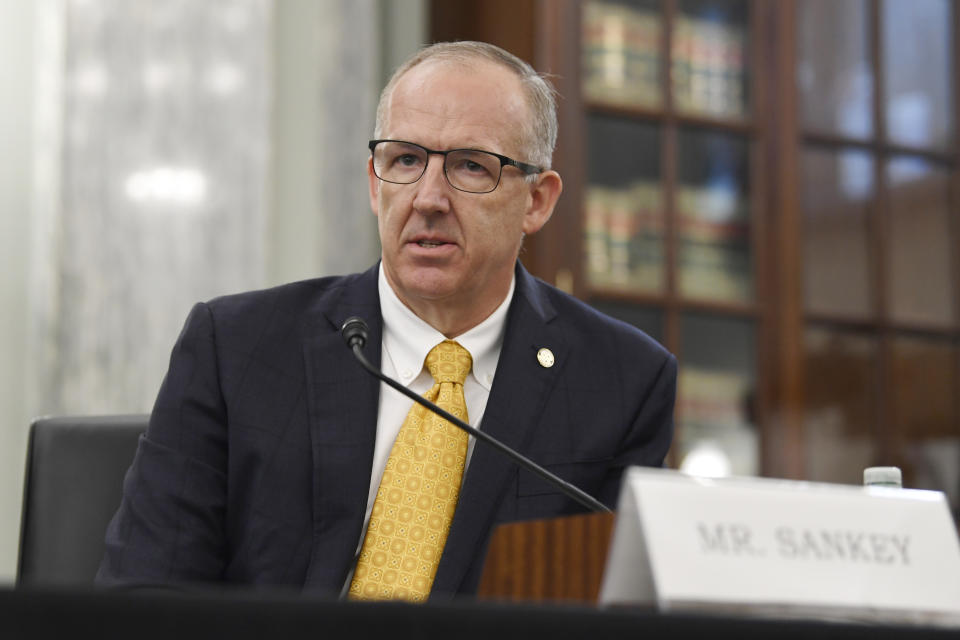SEC commissioner 'concerned' women's sports could lose funding if prominent male athletes generate significant endorsements
It sure seems like a stretch to think that a star college football player’s commercial for a local car dealership could negatively impact women’s sports at his school. But SEC commissioner Greg Sankey told a Senate committee on Wednesday that he was “concerned” about the possibility.
Sankey was one of five witnesses testifying in front of the U.S. Senate committee on Commerce, Science and Transportation. The NCAA is pushing for Congress to write federal legislation governing how athletes can get sponsorships and endorsement income to override state laws already passed on the topic and help the governing body implement its rules loosening restrictions on the income athletes can receive ahead of the 2021-22 seasons.
NCAA members’ willingness to allow athletes to make money off their Name, Image and Likeness (NIL) is long overdue and only comes because states like California and Florida forced their hand. And we also saw on Wednesday why that shift took so long to happen.
In his prepared statement to the committee, Sankey reiterated that the Power Five conferences don’t want incoming freshmen to be able to receive endorsement or sponsor money until their second semesters. That type of clause would limit the earning potential of a star player like high school star Emoni Bates — a presumed one-and-done basketball player who committed to Michigan State on Monday — assuming Bates actually goes to college.
And Sankey also noted that he wondered if the money that star male athletes at schools could earn from third parties would then, somehow, have an effect on female athletes.
“I am concerned that the amount of NIL activity around football and men’s basketball will pull away funding from women’s sports,” Sankey told Sen. Shelley Moore Capito (R-WV).
Capito’s question to Sankey and other members of the panel included a reference to Title IX. Attorney Dionne Koller, a law professor at the University of Baltimore, disagreed with Sankey’s concerns.
“Senator, I think this is an area where there’s just a gender equity opportunity,” Koller said. “So Title IX of course does not apply at all to Name, Image and Likeness deals that are provided by third parties. So if colleges get involved, which I don’t think anybody on this panel supports, then we’d have a Title IX problem — a direct Title IX problem.
“But the types of deals talked about now present no Title IX issue. In terms of promoting gender equity, generally, the main time when women athletes can profit off their Name, Image and Likeness is in college sports. They very often don’t have professional opportunities and I think the SEC is a great example, these women can really monetize what they have and I think it will promote gender equity not hinder it.”
Sankey’s concerns likely stem from a fear among colleges that businesses will stop advertising with and donating to athletic departments and instead give that money directly to players, though it’s absolutely not clear at all if that would actually happen. The phrase “unintended consequences” was uttered a lot throughout the nearly three-hour hearing.

How much could Katelyn Ohashi have made?
Koller brought up UCLA gymnast Katelyn Ohashi’s viral floor routine as an example of how a female athlete could monetize their likeness under loosened NCAA rules. Despite becoming an internet sensation because of her athletic prowess, Ohashi wasn’t able to capitalize on sponsorship money because she was a college athlete.
“She could have really monetized that,” Koller said. “She could have been an Instagram influencer, a social media star. Started a YouTube channel … But I think this is where women athletes can really use digital platforms to launch brands. To create brands. Nutrition podcasts. There are any number of things.”
The NCAA’s working group to change Name, Image and Likeness rules openly admitted that the rise of social media was a driving factor in finally working to change the rules around college athlete endorsements. Currently, a student who doesn’t play sports can make money as a social media influencer but an athlete is barred from doing so.
Eric Winston: Inequity already exists
In addition to Sankey and Koller, Ole Miss athletic director Keith Carter, Ohio State president emeritus Michael Drake and former NFL offensive lineman Eric Winston were witnesses at the hearing.
There was considerable discussion about keeping things equitable in college sports if players were able to get endorsement money. And Winston, the former head of the NFL Players Association and a former player at Miami, made sure to bring a dose of reality to the conversation.
“There’s a perceived, seems like fallacy going on right now that there isn’t already massive inequity in the college athletic system,” Winston said. “Take a look at the facilities at Ohio State compared to Ohio University. At Ole Miss, compared to Southern Miss. There’s massive disparities already. Acting as if we’re going to give college students some rights to make money as if that’s going to create some massive inequity in a system that already has a massive recruiting inequity already is I think is a big fallacy that is being perpetrated — not necessarily intentionally by any of the members here or by the witnesses here. It seems we’re pretending that there’s some sort of equity across the playing field across the playing field of college athletics that simply does not exist.”
– – – – – – –
Nick Bromberg is a writer for Yahoo Sports.
More from Yahoo Sports:

 Yahoo Sports
Yahoo Sports 
